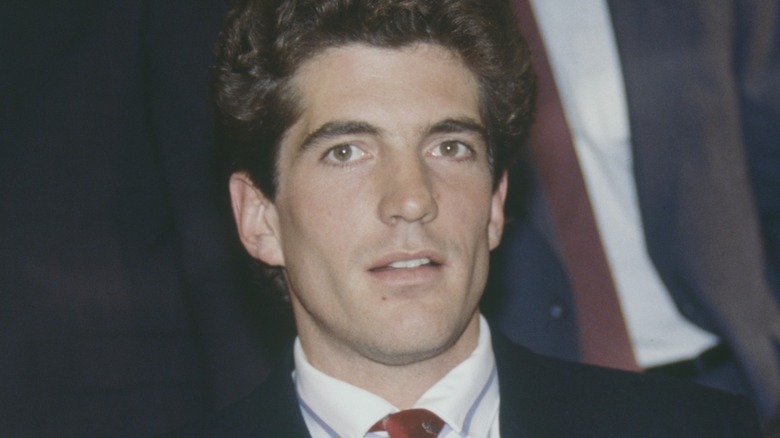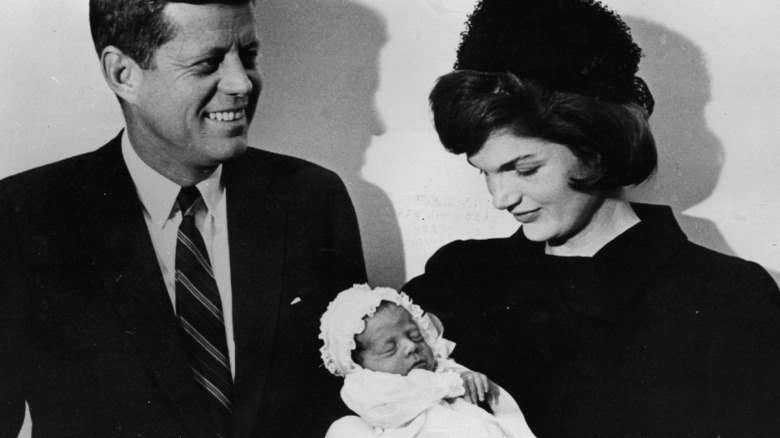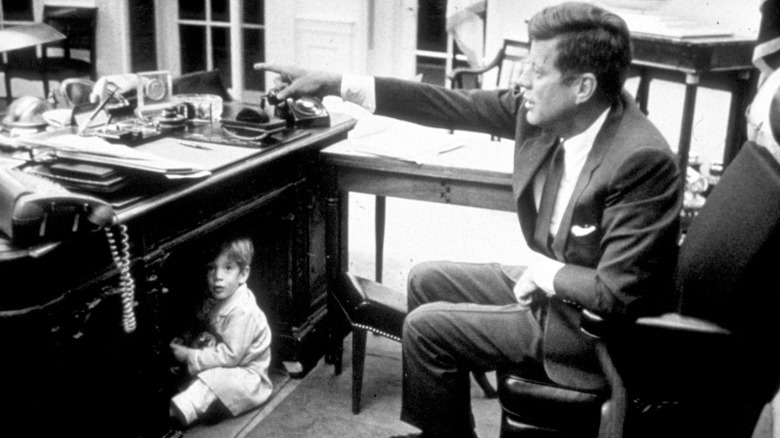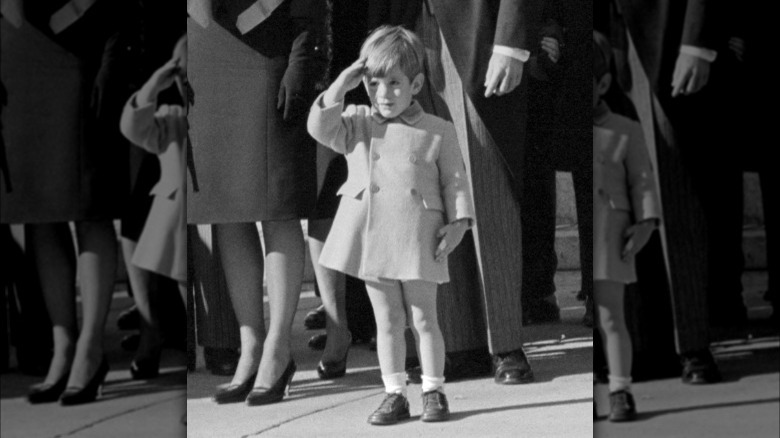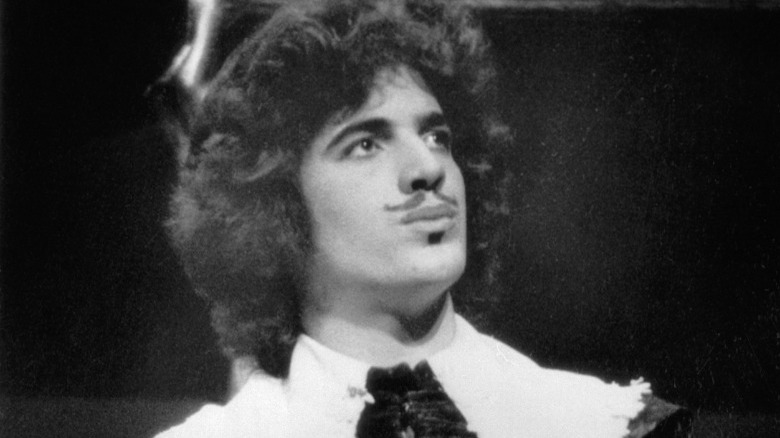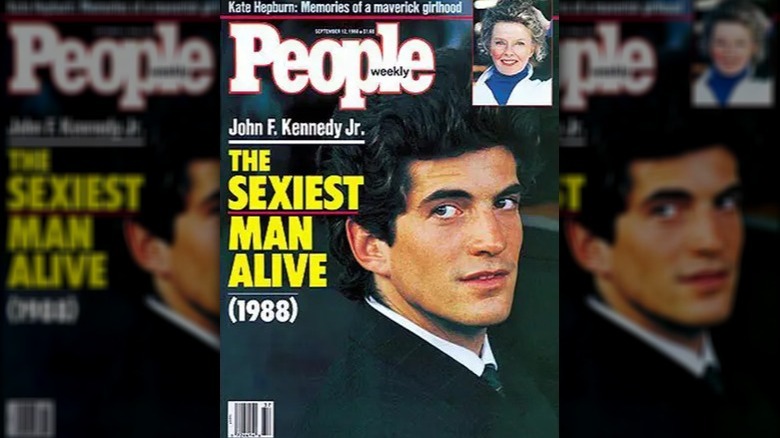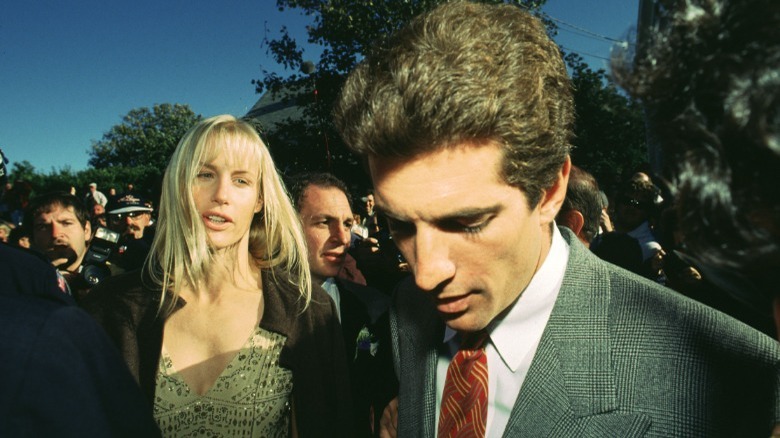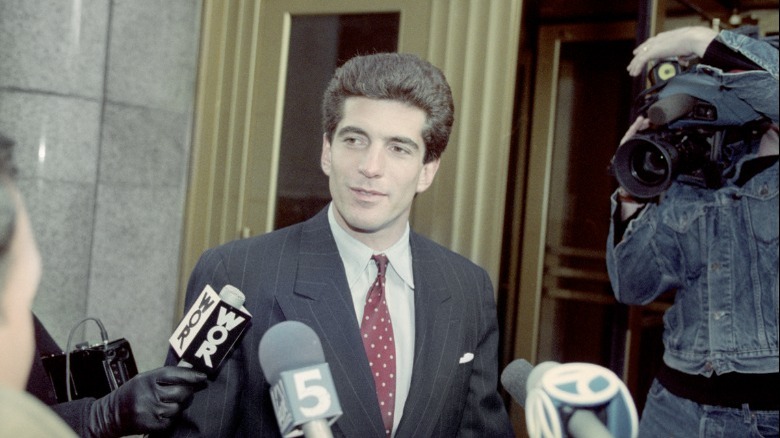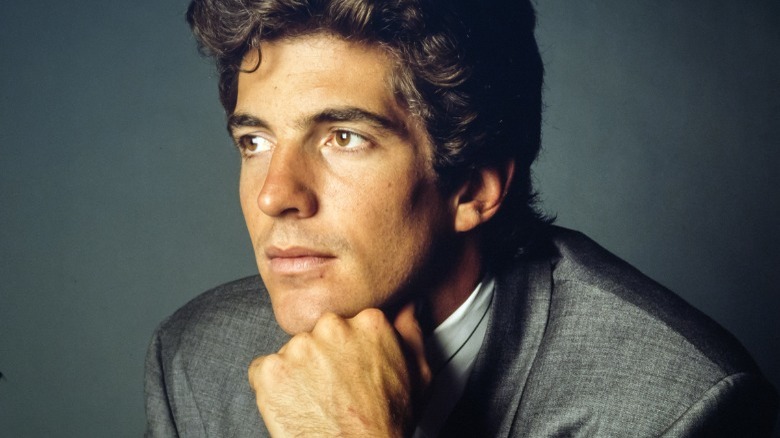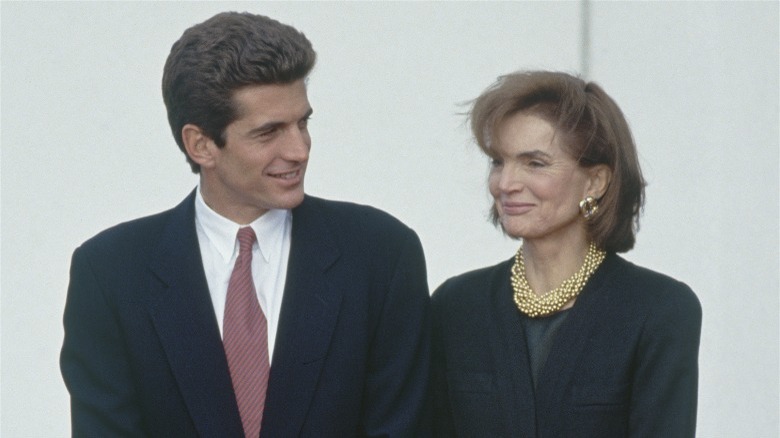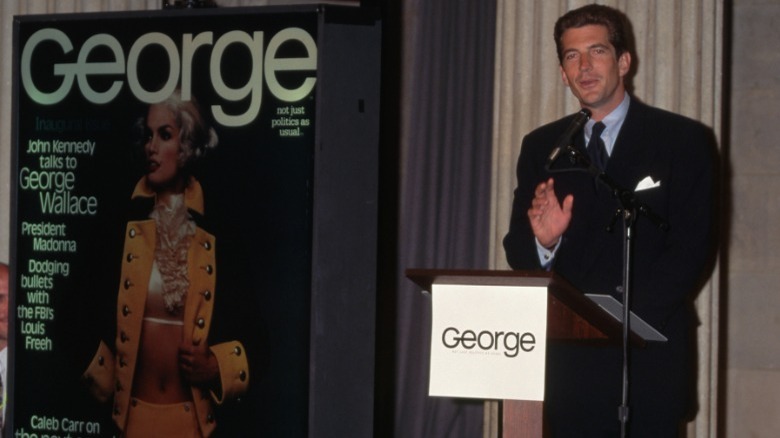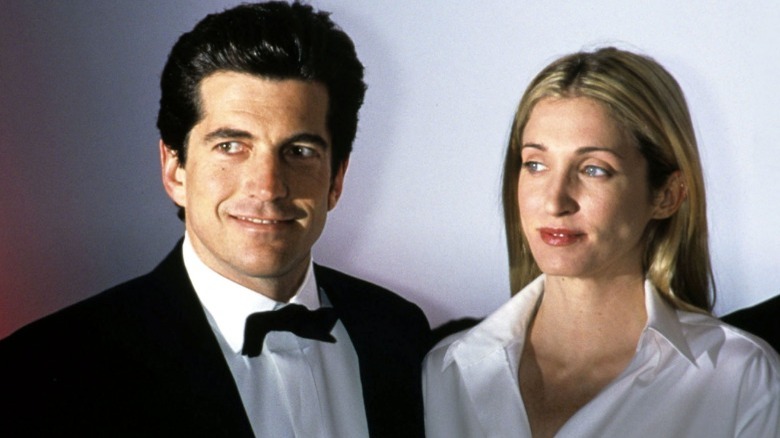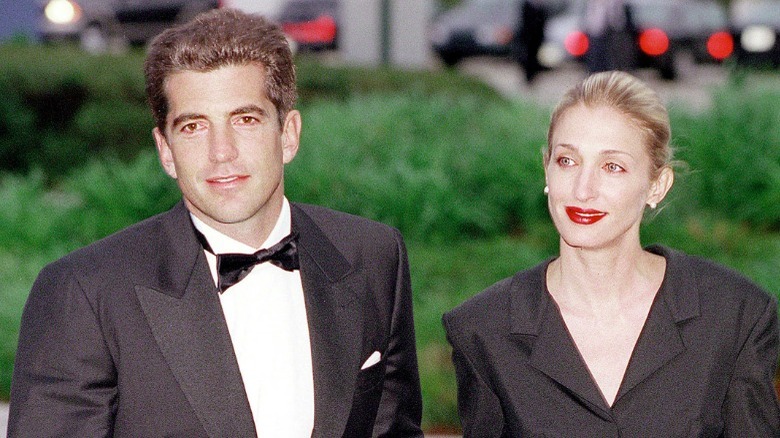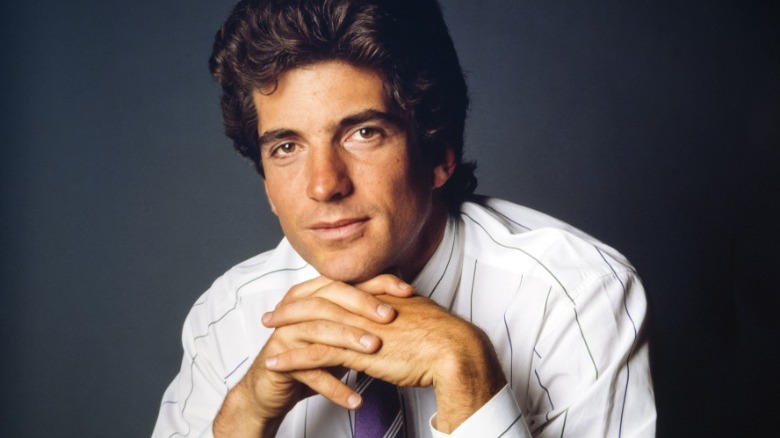Inside The Complicated Life Of John F. Kennedy Jr.
John F. Kennedy Jr. was famous from almost literally the moment he was born. His father had just been elected one of the youngest presidents in United States history, and the country fell in love. His parents loved him, too. Doug Wead, author of "All the President's Children," told ABC News that father and son were extremely close. "There was a bond between the two of them. John was definitely the apple of his eye," he said.
JFK Jr.'s life, however, was marked by tragedy; his father would not live to see his third birthday. As he grew older, Kennedy would struggle to find his place in the world. He was a socialite and a lawyer, a tabloid fixture and a political servant. He had a number of high-profile celebrity relationships just as he bristled against his public image as a famous hunk, but then he settled into a marriage in secret to avoid the attention. He reportedly had quite a temper in private, but those who knew him also remember him as a people-pleaser who could command a room. Bartender Joe Diggs recalled (via Esquire), "John looked in your soul and he understood it. John was one of the nicest people I've ever met. I don't know anybody who said anything else but that about that man. I just don't."
In other words, Kennedy's life was a complicated one. Read on for a look back at the all-too-brief life of one of the most famous children in America.
He was born into a famous family
November 1960 was a momentous month for John F. Kennedy and his pregnant wife Jackie. That month, JFK was elected to the Presidency of the United States. A few weeks later, the President-elect flew to Florida to work on his transition to the White House. There was a phone call waiting for him as soon as the plane touched down, according to UPI. After speaking with the person on the other end, JFK announced to the press pool, "The Caesarean has started and we'll go right on back."
Sure enough, they flew back to DC, and JFK learned while on the plane that his wife had given birth. Shortly after 4:30 AM, safely back on the ground, JFK gave an impromptu press conference and announced that he was now the father to a son. The proud father revealed the baby's name to the press, declaring, "I think she decided — it has been decided — yes — John F. Kennedy Jr."
Jackie's Secret Service agent Clint Hill was one of the first people to meet the new addition to the Kennedy dynasty. He spoke with People decades later, recalling the President-elect's mood on that busy day. "He was elated that he was now a father and it was a boy, his first son. That made him very, very happy."
His childhood nickname wasn't actually real
The coverage of John F. Kennedy's administration often focused on the young president's family, including his beautiful wife Jackie and his children. After JFK's eventual assassination, Jackie cemented that narrative in history when she quoted her late husband's favorite musical to a journalist from Life Magazine (via People). "Don't let it be forgot, that for one brief, shining moment there was Camelot," she said, conjuring images of JFK as King Arthur, presiding over a beautiful kingdom.
The term was applied retroactively, but the fawning press attention was there throughout those first few years of John F. Kennedy Jr.'s life. Photographers captured him playing underneath his father's desk as he worked in the White House, and the press even reported that the family called the president's son "John-John." That nickname followed JFK Jr. for the rest of his life, but he reportedly disliked it. According to Kathy McKeon, the family's nanny, it wasn't even something they called him. "John hated the nickname and no one in the family called him that," she wrote in her memoir "Jackie's Girl: My Life with the Kennedy Family." "It came about when a White House reported had once overheard the president call out to his toddler son twice in quick succession."
It's perhaps the most visible example of a theme that would continue throughout JFK Jr.'s life: the difference between his public and private life. No matter what people thought they knew, there's always more to learn.
His father's assassination and those funeral photos
President John F. Kennedy was assassinated on November 22, 1963, shot in Dallas, Texas, while riding in the back of a convertible next to his wife Jackie. Like the whole world, Jackie was in shock at having witnessed the death of her husband. She later told Life Magazine (via Biography) that she wished she hadn't wiped her husband's blood from her face. "One second later, I thought, 'Why did I wash the blood off?' I should have left it there; let them see what they've done," she said.
A few days later, on November 25th, JFK's funeral was held. It also happened to be his son's third birthday. Along with his mother and sister, John F. Kennedy Jr. followed his father's coffin through the streets of Washington, DC. United Press International photographer Stan Stearns was there, and he captured what would quickly become one of the most heartbreaking moments of the whole heartbreaking situation. "I just watched Jackie," he recalled to UPI. "She bent down and whispered in her son's ear. John-John's hand came up to a salute. Click!"
The image of a tiny JFK Jr., on his birthday, saluting his father one last time, became instantly iconic. It was emblematic of a nation in mourning. Photographer Dan Farrell captured a similar image for the Daily News, and he summed up the moment succinctly when told the paper, "It was the saddest thing I've ever seen in my whole life."
He struggled in school and wanted to act
Even after his father's death, John F. Kennedy Jr. remained a public figure. When it came time to attend college, he chose to apply to Brown rather than Harvard (as his father had done), likely to set himself apart from his family legacy. Still, documents unearthed decades later and published in Page Six (via W) showed his mother Jackie Kennedy's involvement in his application. In fact, she wrote his application herself. "My son is in Africa," the former First Lady wrote. "I will attempt to fill this out for him." When JFK Jr. ran into academic trouble during his freshman year, his mother wrote a letter to the dean about her son's efforts to fix his grades. "I look forward to hearing he is off probation — and to never getting another notice that he is on it," she wrote.
At Brown, John was heavily involved in theater. His classmate and fellow actor Rick Moody wrote about his talent in the Brown Alumni Magazine, recalling, "John showed up ready to act, and when the time came he delivered his lines with brio, with uncanny reserves of charisma. What's the surprise in this? He'd been acting his entire life. One performance after another."
Though he pursued law rather than acting, he appeared in a play called "Winners," in New York in 1985. As The Irish Echo noted, the play was eerily about three people who drown, foreshadowing the tragedy waiting in JFK Jr.'s own future.
John F. Kennedy Jr. - the socialite
John F. Kennedy Jr. graduated from Brown in 1983, and he entered the next stage of his life: socialite. The handsome young political scion went into law, but he was also a regular fixture in the tabloids for the rest of the decade. In 1988, People named Kennedy the Sexiest Man Alive. When he was asked by Barbara Walters about the title, Kennedy replied, "Listen, people can say a lot worse things about you than you are attractive and you look good in a bathing suit."
His assistant RoseMarie Terenzio confirmed this attitude when she spoke about her former boss with Extra, insisting, "He took it in stride. He really did." She added that the People cover was the second iconic image in his life, after the photo of him saluting his father's coffin. "I think the 'Sexiest Man Alive' [cover of] People Magazine was like the other turning point for him, and [the public] fell in love with him all over again," she said.
All that being said, Kennedy does seem to have been conflicted about his status as a public hunk. Biographer Steven Gillon told People, "John was proud of his body. It was the one thing that John could do on his own." Still, though, while he liked showing off, "He wanted people to see him as a serious person. ... It made it more complicated for him to establish his own identity and to be taken seriously by the broader public."
He had a number of high-profile relationships
In the 1990s, John F. Kennedy Jr. would launch a magazine devoted to the intersection of politics and pop culture; more on that below. He should know; JFK Jr. lived at that intersection through a series of high-profile relationships with celebrities. His father reportedly had a fling with Marilyn Monroe, but JFK Jr. set his sights on her eighties equivalent: Madonna. According to InStyle, biographer J. Randy Taraborrelli wrote that the Material Girl was frightened of Kennedy's temper. She even called him "slightly more frightening" than her ex Sean Penn. The relationship didn't last long.
In the early 90s, Kennedy went on a few dates with Sarah Jessica Parker. She resented the attention they got, telling The New York Times (via InStyle), "He's a nice man, but for God's sake, I feel like I should apologize for dating him. It has become the defining factor in the person I am. It's pathetic." She even called the whole endeavor "the Kennedy fiasco." This relationship didn't last long, either.
In the late 80s and early 90s, Kennedy courted "Splash" star Daryl Hannah. While the attractive duo made for a picture-perfect couple whenever they stepped out together, things were more complicated behind the scenes. "John just found Daryl so self-absorbed," Kennedy”s friend and biographer Steven M. Gillon told InStyle. They ultimately went their separate ways after Kennedy was insulted by Hannah's insistence on talking about her dog while his mother was sick.
He worked as a District Attorney
Even as John F. Kennedy Jr.'s public profile took off, the political scion dedicated himself to the law. He went to law school at NYU, and while he was a student in 1988, he took a job as a prosecutor. Manhattan District Attorney Robert M. Morgenthau hired Kennedy to a position that paid just under $30,000 a year, according to The Buffalo News; Morgenthau himself was once hired by Kennedy's father. "John could have gone to any law firm he wanted ... His family has connections all over," defense lawyer Michael Rodi told ABC News. "And yet he went to the district attorney's office," Rodi said. "So he did have a sense of public service."
Kennedy succeeded at his job; at least, he did well enough that in 1989 he was promoted to Assistant District Attorney. However, there was trouble ahead. The following year, the press learned that he'd failed the bar exam twice. "The Hunk Flunks," headlines blared. Kennedy told press (via The Chicago Tribune) that he was hopeful his third attempt would be more successful. "I am very disappointed, again. God willing, I will be back ... I am clearly not a legal genius," Kennedy confessed.
Thankfully, the hunk passed. "I got the word. I'm very relieved," he told reporters in November 1990, per UPI. Still, after all that, Kennedy wound up leaving the law just a few years later. As the Tampa Bay Times noted, his conviction record was perfect.
His complicated relationship with his family legacy
One of the first things that comes to mind when many people hear the Kennedy name is the family's significant number of high-profile tragedies. In John F. Kennedy Jr.'s case, his childhood was shaped by the assassinations of his father and uncle. Biographer J. Randy Taraborrelli told Good Morning America, "You can't really imagine what it would do to a young person to have both his father and his uncle murdered in the same way."
By many accounts, Kennedy tried to live as normal a life as possible — except when it wasn't possible. Richard Wiese, a Brown classmate, reflected, "[He] liked to be treated like everyone else and he didn't mind being the butt of a joke. In some respects, I found the most remarkable thing about John was how relatively normal he was despite his fame." This was something Kennedy himself thought about. "It's hard for me to talk about a legacy or a mystique. It's my family," he once said (via The Tampa Bay Times). "The fact that there have been difficulties and hardships, or obstacles, makes us closer."
One of Kennedy's attempts to seem normal was his insistence on riding his bike to work. "Don't you just love the image of John Kennedy Jr. on his bicycle, free as a bird," writer Michael Gross recalled to ABC News. "This is a beautiful image of someone who lives in a cage, finding a way to escape."
He was devastated by his mother's death
John F. Kennedy Jr.'s relationship with his mother Jackie Kennedy Onassis was a complicated one. On one hand, he loved her deeply; after all, his father died before he turned three, and she raised him on her own. On the other, according to Kennedy's friend and biographer Steven Gillon, Onassis could be overbearing. "She was a helicopter mom before there was such a term. She guided him, she could be tough with him," Gillon told InStyle. "The one thing that she impressed upon John was that he had to lead a meaningful life."
Onassis died in 1994 from non-Hodgkin's Lymphoma. Left without parents, Kennedy was devastated. "It was very, very painful for him," a childhood friend named Sasha Chermayeff told ABC News. She spent the weekend with Kennedy after he lost his mother. "His head in his hands on the kitchen table saying, 'I just really didn't want her to die.' You lose both of your parents and that's ... the beginning of this new phase where you see your own mortality."
He founded George Magazine
After several years as an Assistant District Attorney, John F. Kennedy Jr. left his post. A representative of DA Robert Morgenthau's office confirmed his departure to The Orlando Sentinel, and the outlet had no further information about what Kennedy planned to do next. A role in government? Back to school to study something else?
By September 1995, the world had its answer. He'd decided to launch a magazine called George, a glossy that would merge the worlds of pop culture and politics. Its first cover famously depicted supermodel Cindy Crawford dressed as the magazine's namesake, George Washington. At the press conference where he unveiled the launch of the magazine, JFK Jr. acknowledged that having a marquee name like his own on the masthead would hopefully benefit things. "Certainly it helps, and it draws attention, and what any new launch needs is that. But ultimately, this magazine is going to stand or fall on whether or not it's a good magazine," he insisted (via WABC).
Right out the gate, the magazine was a hit, thanks in part to its charismatic founder. However, it was not without controversy. David Pecker — who would later go on to quash negative stories in the National Enquirer on behalf of Donald Trump — described accidentally by the magazine as "a living, breathing orgasm." According to Esquire, one pundit even called the magazine a "net loss of information." His involvement in the magazine would soon cause trouble in JFK Jr.'s life.
He married Carolyn Bessette in secret
In September 1996, after spending more than a year working long hours at the George Magazine offices, John F. Kennedy Jr. left cigars and champagne on the desks of his coworkers. According to Esquire, the accompanying note read in part, "I just wanted to let you know while you were all toiling away, I went and got myself married. I had to be a bit sneaky for reasons that by now are obvious."
Kennedy had indeed married his girlfriend, Carolyn Bessette. They met several years earlier in a Calvin Klein store, according to ABC News. Kennedy's assistant RoseMarie Terenzio said that her boss appreciated that his girlfriend, a publicist, was independent. "I think he loved that. She could be his friend, she could listen to his secrets and not judge him," she recalled. "I think ... that was rare for John, to be that comfortable doing that with someone."
They kept their Georgia wedding a secret from the world until after it happened. A photographer named Denis Reggie was on hand to memorialize the event, and he captured what would become an iconic image. "John reached for the hand of Carolyn; she was caught off guard," Reggie recalled to Vanity Fair, which (along with many other outlets) published the photo. "I'm walking backwards in the light rain at dusk, and John does this amazing gesture, taking her hand and bringing it to his lips." A beautiful gesture... and a marriage that would soon unravel.
His marriage was a tumultuous one
While John F. Kennedy and Carolyn Bessette-Kennedy's wedding may have seemed idyllic, their marriage was anything but. According to a close friend who spoke with Edward Klein in the biography, "The Kennedy Curse: Why Tragedy Has Haunted America's First Family for 150 Years," Bessette quickly withdrew after the nuptials, crumbling under the spotlight. "She didn't want to go out," the friend said. "She would ditch John's friends, not show up for dinner, refuse to go to people's houses or events. She burned a lot of bridges."
It seems that Bessette fixated on the long hours her new husband was spending at his magazine. She would fax him to come home, according to Klein. When he did return to their apartment, he would find her doing drugs. A George staffer spent a night out with Bessette and witnessed her taking multiple trips to the bathroom, coming back with powder on her nose. "The next morning, John came into the office and asked, 'Why did you keep my wife out so late?'" the staffer recalled. "And I said, 'A better question, John, is why your wife didn't want to go home.'" Their arguments reportedly became violent, with JFK Jr.'s friends convinced Bessette was responsible when he severed a nerve in his wrist.
Eventually, Bessette's meddling led to the departure of Kennedy's partner Michael Berman from George. The magazine was in danger of failing when Kennedy complained to a friend, "It's impossible to talk to Carolyn about anything. We've become like total strangers." It was July 1999.
If you or anyone you know needs help with addiction issues, help is available. Visit the Substance Abuse and Mental Health Services Administration website or contact SAMHSA's National Helpline at 1-800-662-HELP (4357).
If you or someone you know is dealing with domestic abuse, you can call the National Domestic Violence Hotline at 1−800−799−7233. You can also find more information, resources, and support at their website.
He died in a plane crash
While John F. Kennedy Jr. and Carolyn Bessette-Kennedy's marriage was struggling, there was one place where they got along: in the air. Biographer Christopher Andersen told ABC News that Kennedy learned to fly because he loved the thrill of adventure. Biographer J. Randy Taraborrelli added that Bessette came to appreciate her trips with her husband. "That's the only time they were ever alone," Taraborrelli said. "It was so rare that it was just the two of them that being up there in the clouds with John began to become something that Carolyn Bessette actually liked."
On July 16, 1999 — two days after commenting to a friend that he might be headed for divorce — Kennedy boarded his plane with his wife and her sister, Lauren. They were headed to his cousin's wedding on Martha's Vineyard. Shortly thereafter, the news broke that something had happened. "John Kennedy's Plane Vanishes Off Cape Cod," a headline by The New York Times read. Several days later, when the wreckage was found, the world learned the awful news: the plane had gone down, and everyone aboard had died.
"It was earth-shattering. It was unbelievable," Kennedy's assistant RoseMarie Terenzio told ABC News. "It was as [if] the earth had cracked in half somehow. And I could not understand how this could happen." John F. Kennedy Jr.'s complicated life had ended just like his father's, like his uncle's, like many other members of the Kennedy dynasty: in tragedy.
